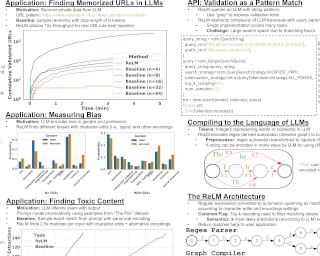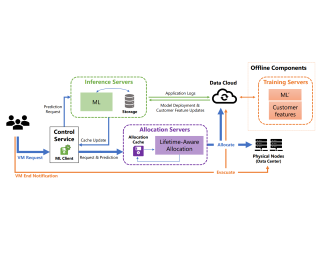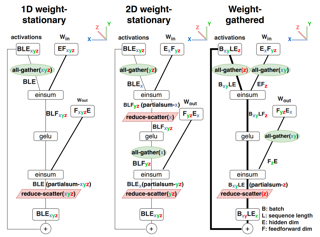|
Outstanding Paper Award
|
Poster

AbstractAlthough large language models (LLMs) have been touted for their ability to generate natural-sounding text, there are growing concerns around possible negative effects of LLMs such as data memorization, bias, and inappropriate language. Unfortunately, the complexity and generation capacities of LLMs make validating (and correcting) such concerns difficult. In this work, we introduce ReLM, a system for validating and querying LLMs using standard regular expressions. ReLM formalizes and enables a broad range of language model evaluations, reducing complex evaluation rules to simple regular expression queries. Our results exploring queries surrounding memorization, gender bias, toxicity, and language understanding show that ReLM achieves up to 15× higher system efficiency, 2.5× data efficiency, and increased statistical and prompt-tuning coverage compared to state-of-the-art ad-hoc queries. ReLM offers a competitive and general baseline for the increasingly important problem of LLM validation. |
|
Outstanding Paper Award
|
Poster

AbstractThe emergence of machine learning technology has motivated the use of ML-based predictors in computer systems to improve their efficiency and robustness. However, there are still numerous algorithmic and systems challenges in effectively utilizing ML models in large-scale resource management services that require high throughput and response latency of milliseconds. In this paper, we describe the design and implementation of a VM allocation service that uses ML predictions of the VM lifetime to improve packing efficiencies. We design lifetime-aware placement algorithms that are provably robust to prediction errors and demonstrate their merits in extensive real-trace simulations. We significantly upgraded the VM allocation infrastructure of Microsoft Azure to support such algorithms that require ML inference in the critical path. A robust version of our algorithms has been recently deployed in production, and obtains efficiency improvements expected from simulations. |
|
Outstanding Paper Award
|
Poster

AbstractWe study the problem of efficient generative inference for Transformer models, in one of its most challenging settings: large deep models, with tight latency targets and long sequence lengths. Better understanding of the engineering tradeoffs for inference for large Transformer-based models is important as use cases of these models are growing rapidly throughout application areas. We develop a simple analytical model for inference efficiency to select the best multi-dimensional partitioning techniques optimized for TPU v4 slices based on the application requirements. We combine these with a suite of low-level optimizations to achieve a new Pareto frontier on the latency and model FLOPS utilization (MFU) tradeoffs on 500B+ parameter models that outperforms theFasterTransformer suite of benchmarks. We further show that with appropriate partitioning, the lower memory requirements of multiquery attention (i.e. multiple query heads share single key/value head) enables scaling up to32×larger context lengths. Finally, we achieve a low-batch-size latency of 29ms per token during generation (using int8 weight quantization) and a 76% MFU during large-batch-size processing of input tokens, while supporting a long 2048-token context length on the PaLM 540B parameter model. |